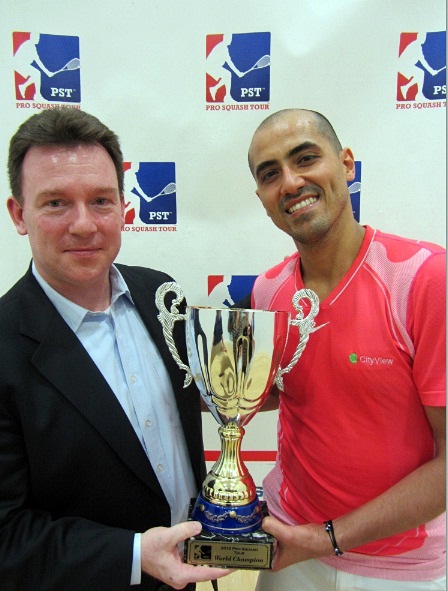Q & A With The Pro Squash Tour's Controversial Joe McManus
from DailySquashReport.com

Joe McManus with Wael El Hindi
September 20, 2012
Your 2012-13 season, which opens this weekend in suburban New York, makes how many years now for the PST? How many events this season?
We will manage approximately 30 tournaments across the globe in this, our fourth, season.
How is it going overall?
Great.
What are some of the highlights on tap this season?
ProSquashTV is an important part of our future. Matches will be free for fans to watch. It will take time for it to reach its full potential, but we are committed to it for the long term.
Thierry Lincou’s return to PST is an exciting way to begin the season. We’ve known since last January he was coming back, but it was great to be able to finally announce it publicly.
Kenneth Tuttle is doing great work building our new Asia-Pacific circuit.
People rarely see her name, but Georgetta Morque remains the most creative person on our team. As I am giving you my response, she is receiving a Silver Mercury Award for her success in promoting squash. She is doing a brilliant job getting squash covered in the mainstream press, and I think of her as a walking highlight reel.
What motivated you to found the tour?
First, love of the game.
We did our first tournament to bring pro squash back to the Boston area, which hadn’t had a pro event in a few years. After doing one, we decided to try and do more.
We saw some opportunities to grow the game and make it more exciting. The ideas we discussed trying weren’t necessarily embraced by the existing infrastructure, so we decided to do them on our own.
We started with invitational events. When some rising stars asked if they could enter our tournaments, we opened them up. Adding season standings was a natural extension to connect our tournaments.
We’ve never been shy about trying new things or acknowledging a mistake. I think that has helped us grow and has improved the quality of our product.
What is a typical day like?
Every day I think about our three main stakeholders: fans, sponsors, and players. My goal each day is to focus on improving our tour for each of them.
What is your background and what did you do previously?
I grew up in Massachusetts. Athletics were a very important part of my early life, but I didn’t play squash until my friend Hoyt Taylor introduced me to the game, while we were both at Groton School.
I studied classical music at Boston University and got an MBA from Babson College, where I was focused on entrepreneurial studies.
My professional experience revolves around campaign management. I have worked both as a political consultant and at the American Diabetes Association. At ADA I served in a variety of capacities, most recently as Executive Director.
For a couple years, I lived in China and worked on some less than glamorous projects. I do regret that my language skills seem to be deteriorating on a daily basis.
What do you say in defense of opening your tour to Stephane Galifi, who is under a WSF ban?
We are thrilled to have Italy’s best player join PST.
PST is not a member of the WSF. If we had any relationship with them, we would honor their rules – whether we agreed with them or not.
One of my roles with Pro Squash Tour is to ensure each player enters the court with a fair opportunity to compete. PST rules of conduct on court are the strictest in the world and will continue to be so.
What would you like to see in terms of a resolution concerning the ongoing dispute with the PSA? Are you optimistic?
I am very optimistic about our tour’s future.
We have no dispute with the PSA or anyone else in the squash community.
PST, without restriction, is open to any athlete who wishes to compete. Our mantra is let the best athlete win.
For those who don’t know, PSA banned their members from playing in PST tournaments in 2010. In 2011, they added another ban which prevented PST players from being added as local wild cards in PSA tournaments.
We initially looked at legal options to have the ban lifted, but quickly realized it didn’t make sense for us to absorb a large legal bill to change another organization. We chose instead to invest our resources in our own tour.
PSA is essentially a labor union with a few hundred dues paying members. Like all unions, their leadership and membership may, at times, see the world through a different lens.
I believe the PSA bans ultimately only hurt their own membership. But it remains their choice how to proceed.
Where do you see the tour in five years?
In 2009, I couldn’t possibly have predicted how quickly we’ve ultimately grown. So, in some ways I feel silly trying to give a projection.
Our plan is to build a collection of regional and national circuits across the globe culminating in an annual world championship event. Yes, we want to do larger events in bigger venues but it is important to have a strong foundation first. Ironically, I view our smaller and mid-sized events as a greater priority.
What do you enjoy most about it?
I spend a great deal of time listening to our fans both online and in person. It means a great deal to me when someone takes the time to share their views on how to improve the presentation of the game.
The best moments for me are when I can call someone who previously gave me advice and tell them that not only did I take their advice, but that their suggestion fixed a problem or made some part of our tour better.
For a variety of reasons, change cannot always be implemented immediately. But our tour is built around our fans, and their input means the world to me.
Back To Main


